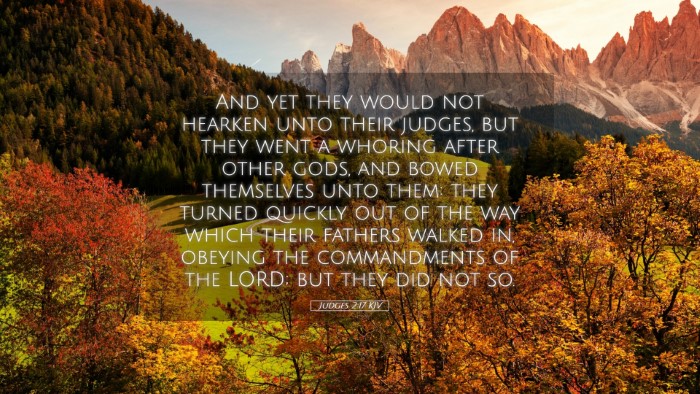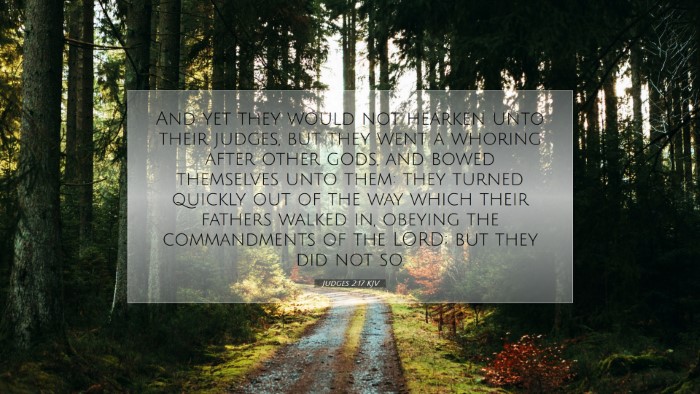Old Testament
Genesis Exodus Leviticus Numbers Deuteronomy Joshua Judges Ruth 1 Samuel 2 Samuel 1 Kings 2 Kings 1 Chronicles 2 Chronicles Ezra Nehemiah Esther Job Psalms Proverbs Ecclesiastes Song of Solomon Isaiah Jeremiah Lamentations Ezekiel Daniel Hosea Joel Amos Obadiah Jonah Micah Nahum Habakkuk Zephaniah Haggai Zechariah MalachiJudges 2:17
Judges 2:17 KJV
And yet they would not hearken unto their judges, but they went a whoring after other gods, and bowed themselves unto them: they turned quickly out of the way which their fathers walked in, obeying the commandments of the LORD; but they did not so.
Judges 2:17 Bible Commentary
Bible Commentary on Judges 2:17
Verse: "Yet they would not hearken unto their judges, but they went a whoring after other gods, and bowed themselves unto them: they turned quickly out of the way which their fathers walked in, obeying the commandments of the LORD; but they did not so."
Introduction
This verse reflects a critical moment in the history of Israel during the period of the judges. It encapsulates the recurring cycle of disobedience and repentance that characterizes the narrative of the book of Judges. The significant themes of idolatry, rebellion, and the faithfulness of God amidst human infidelity are crucial for understanding this verse.
Contextual Background
The book of Judges provides an extensive narrative covering approximately 400 years of Israel's history after the death of Joshua. It illustrates a pattern of sin leading to oppression, crying out to God, deliverance through a judge, and then falling back into sin, thus perpetuating a cycle of spiritual decline.
Analysis of Key Themes
- Rebellion Against God: The Israelites' choice to forsake their judges indicates a deliberate decision to reject God's appointed leaders and His law. The term “they would not hearken” implies a willful disobedience coupled with a refusal to listen, signifying a hardened heart.
- Idolatry: The phrase “went a whoring after other gods” vividly illustrates the spiritual adultery of the Israelites. It reflects the Covenant relationship with God that was betrayed by their worship of other deities, which ancient Israel often adopted from surrounding nations.
- Historical Contrast: The statement “they turned quickly out of the way which their fathers walked” serves as a contrast to the faithfulness of their ancestors. The “fathers” represent the generation that entered Canaan under Joshua, highlighting the dissonance between their obedience and the current generation's rebellion.
- Divine Judgment and Mercy: This passage leads into a larger narrative about God's judgment on sin and His ongoing mercy. Despite Israel’s unfaithfulness, God remains committed to His covenant, as evidenced by the judges He raises up for their deliverance.
Commentary Insights
Matthew Henry: Henry emphasizes that the Israelite's refusal to follow their judges is a reflection of their deeper spiritual malaise. He articulates that the cycle of sin is not only a historical recount but also a moral warning to remain vigilant against complacency and idolatry in our lives.
Albert Barnes: Barnes expands on the nature of their unfaithfulness, noting that it was not merely idolatry that angered God, but their failure to learn from history and their own fathers. He illustrates the significance of remembrance in faith — that Israel’s history should have been a guide for them not to fall into the same traps of rebellion.
Adam Clarke: Clarke points out the sociological aspects of rebellion, emphasizing how external influences from neighboring nations seduced Israel away from their pure worship of Yahweh. He draws a parallel to the present day, warning contemporary believers about the subtlety of societal pressures that can lead to spiritual infidelity.
Theological Implications
This verse has profound theological implications for understanding the nature of sin, grace, and human free will. It poses important questions regarding the necessity of obedience and the consequences of straying from divine commandments.
- Sin and Its Consequences: Disobedience, as illustrated in this verse, leads not only to personal downfall but also affects the broader community of faith.
- The Role of Leadership: The judges serve as a reminder of the need for godly leadership to guide communities in faithfulness. The rejection of godly authority often results in chaos and spiritual abandonment.
- God's Faithfulness: Even amidst rebellion, God raises up judges, demonstrating His commitment to redeem His people, a theme carried throughout the Scripture that resonates with New Testament teachings on grace and redemption.
Application for Today
The lessons extracted from Judges 2:17 are timeless, applicable for individuals, churches, and denominations today. They serve as a cautionary tale against the idolatry of modern times, which includes not just physical idols but ideologies and practices that contradict biblical teachings.
- Faithfulness in Obedience: It encourages believers to actively live out their faith, remaining steadfast in obedience to God’s Word and resisting cultural temptations.
- Importance of Community: The necessity of accountability within believing communities is underscored. Just as Israel had judges, contemporary churches require leaders who guide them back to faithfulness in times of crisis.
- Remembrance of God's Works: Believers are called to remember the works of God in their lives and in the past, using history as a foundation for trust in God's future deliverance.
Conclusion
Judges 2:17 serves as a poignant reminder of the dangers of spiritual drift and the importance of commitment to God’s commandments. As studies of this verse reveal, the cycle of sin and deliverance showcases the need for vigilance and responsiveness to God's call. The fidelity of Scripture through time urges current and future generations to recognize the importance of adhering to God's ways.


